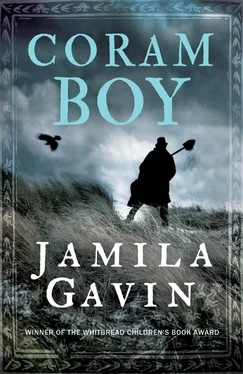Thomas was so miserable that it was almost in his mind to run away back home. After all, it hadn’t been his idea to be a chorister. He would have been quite content to follow his father’s trade as a ship’s carpenter. He was only there because someone heard him singing in a tavern and urged his father to let the boy try for a scholarship as a chorister at the cathedral. But then he thought of all the high hopes his mother had placed on him, and how humiliated his father would be if he got to hear that his own son couldn’t put up with the tauntings of a bunch of choir boys. So somehow he got through each day and each night, having no notion of when it would end and who, in the end, would be his friend or his enemy.
It all changed suddenly. One night, Thomas was hanging by a rope, upside down from the beam, when he became aware of Alexander watching from a corner. He lounged against one of the wooden posts as if he were carved out of it, half in shadow, his face chiselled into a mask. Only his eyes glimmered darkly. He did nothing while two, three times, the boys twisted the rope then let it go, so that he spun fiercely like a top, helpless, dizzy, sick, while the boys laughed uproariously. Alexander’s movement was unexpected. Even his torturers paused and turned. As if to show he was one of the lads, Alexander came forward. He grabbed Thomas’s wrist and roughly tied one of the knots but, while doing so, he whispered in his ear, ‘Make them laugh. If you can make them laugh, they’ll never trouble you again.’
Thomas spiralled slowly from the beam as Alexander retreated to the shadows once more. ‘Make them laugh!’ They were the first words that had been spoken in kindness to him since he arrived. Another boy stepped forward. He was about to start the twisting of the rope all over again, when Thomas mimicked:
‘Err . . . rrum . . . now then . . . errum . . . boys . . . errum . . . let usum turn . . . errum to psalmumm 48 . . . errum . . . ’ he said from upside down in a voice exactly like Dr Smith, the choirmaster.
The boy stopped short. The others looked at each other in amazement, and even checked to be sure it wasn’t in fact Dr Smith, and then they burst out laughing. ‘More, more!’ they demanded. Despite being swung and prodded and spun round and round, still dangling from the beam, Thomas managed to scramble through his repertoire of jokes and rhymes and imitations.
As Alexander predicted, they cut him down, still laughing. But his ordeal wasn’t quite over – perhaps they were having too much fun. They stood him on top of the bookcase and told him to sing. So Thomas sang; he sang all the songs he had ever sung in taverns and inns to make extra pennies for the family; the sea shanties, the mummers’ and morris songs, and foreign songs he’d picked up from sailors and travellers in the inns round the docks, imitating the characters and their accents, which had the boys splitting their sides. Finally, when he felt he had got them sufficiently on his side, he leapt down from the bookcase and went into a dance, accompanying himself with foot-tapping and thigh-slapping. And he even found a pair of spoons which he then played with incredible skill, to everyone’s amazement. Soon all the boys were also foot-tapping and thigh-slapping and making such a rumpus that Mrs Renshaw, the matron, came hurrying in to put a stop to it.
Later, lying on their mattresses side by side in the darkness, instead of dropping wet toads on his face or inserting wriggling spiders into his bed, the boys begged him for more imitations of Dr Smith and the Bishop. He duly obliged, and added Mrs Renshaw to the list, which had everybody giggling and sniggering in the darkness until, gradually, all but Thomas himself subsided into sleep. He lay long into the night, staring into the darkness, wondering if at last his troubles were at an end. They were as far as teasing was concerned; from then on, Thomas was not only accepted but he became the most popular of boys, at least with all except Alexander.
Alexander was a loner and didn’t seem to want any close friends. He often disappeared for hours at a time, and if discovered it was usually at the schoolroom virginals with his nose in a musical score or scribbling on a page of manuscript, much to the scorn of the other boys. In the school it wasn’t always good to be different. Most boys, wearing as they did their uniform jacket and tails and mortar board in school, or the black cassock and white ruffs for cathedral services, managed to seem like a single organism. They conformed to a group mind and a group purpose – except Alexander. He didn’t care. He didn’t try to conform or attempt to be one of them. Where they spoke with the same soft, broad, Gloucestershire dialect, he spoke like a gentleman; where the other boys got up to larks and laughed at the same jokes, he would be standing apart, watching but not joining in; and though they slept side by side, ate together, practised together and studied together, he was never quite one of them, and they referred to him as ‘Gentleman Alex’.
It was not just because he seemed a gentleman that made Alexander different. Although the boys joked about him, they never laid a finger on him and Thomas soon realised they respected him after all, for no one doubted that Alexander had the finest voice of them all and, more than that, was the most musically gifted. Even the bishop treated him with awe and called him ‘our little genius’. Not only did Alexander have the voice of an angel, but he played the harpsichord and virginals precociously well and had composed obsessively from the age of six. His anthems and choral pieces were often sung at services and concerts.
At first, Thomas was disappointed to find himself ordered to sit next to this surly, uncommunicative boy in the schoolroom. Strange that Alexander, who had advised Thomas to make the boys laugh, seemed impervious to jokes and wise-cracking. When Thomas tried to get even a smile out of his companion, his attempt was received with a blank uncomprehending stare. But Thomas was gifted at algebra, and when he saw Alexander drifting helplessly over a calculation, he offered to help him. Alexander grudgingly accepted his assistance and, in due course, reciprocated by helping Thomas with Latin, Greek and French. Then, when Thomas took up the violin, he soon showed himself to be such a skilful performer, Alexander began writing pieces for him. Without realising it, they had become friends.
It was a strange friendship. No two boys were more unlike each other: Alexander introverted and gloomy, Thomas popular and sociable; Alexander able to enchant people with his voice, Thomas to make them laugh. But the difference which troubled Thomas the most was their difference in class and status and when, with each summer, Alexander began to invite Thomas to spend the holidays with him, Thomas always found excuses. Until now. Perhaps it was because Alexander was so sunk in the depths of depression as August approached, so certain that the life he loved was coming to an end, that Thomas agreed to spend the summer at Ashbrook.
The vaulting rang with the sounds of the opening chords of an anthem. The great sound of the organ resonated among the vaultings. The choirmaster’s raised hand demanded attention and, at his stroke, the choristers’ voices burst into song like a dawn chorus.
‘Tommy!’ a voice hissed from behind the pillar. A small bare-footed girl peered round shyly, carrying a bundle in her apron. ‘Our mam’s sent some clothes for you. Wants for you to look like a gentleman.’ She giggled at the thought.
Thomas peeled away from the choir, embarrassed. He pulled his little sister out of sight. ‘What are you doing here, Lizzie?’ he asked roughly.
‘Mam wanted you to be dressed proper for going away. She sent you these.’ Lizzie thrust a bundle into his arms, wrapped in a piece of sail cloth.
Читать дальше












